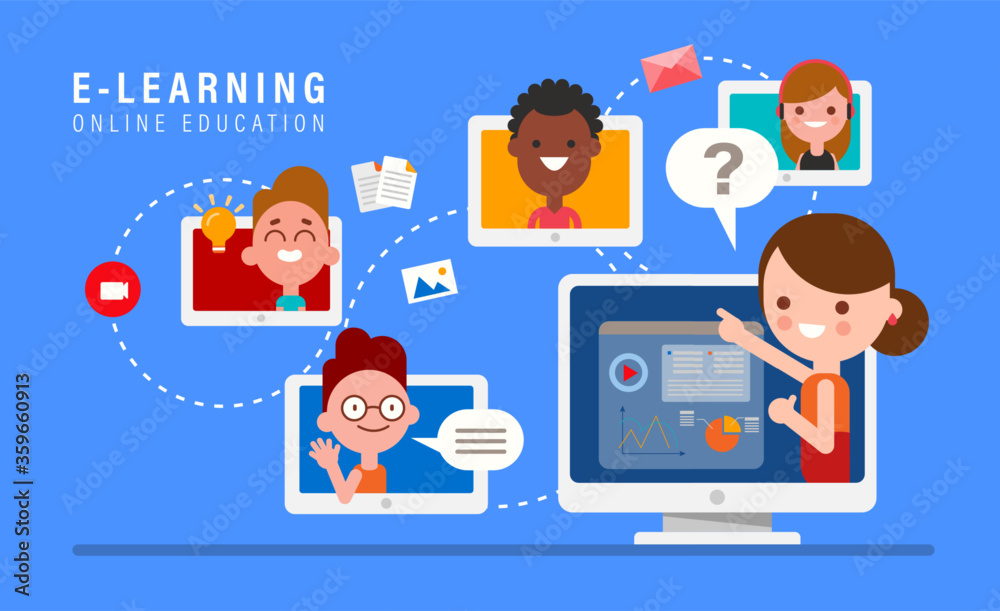Education and Study for Children and Kids: Best Learning Approaches
Education and Study for Children and Kids: Best Learning Approaches
Blog Article
Checking Out the Value of E-Learning for Kids in the Modern Educational Landscape
E-learning platforms offer unrivaled accessibility and adaptability, catering to diverse discovering designs while fostering necessary electronic literacy abilities. As we consider the transformative effect of modern technology on education and learning, it is imperative to check out how e-learning can further improve learning end results and collaboration amongst young students.
Benefits of E-Learning
E-learning supplies countless advantages for children, transforming the way they acquire expertise and skills. E-learning platforms allow children to gain access to academic material from basically anywhere, damaging geographic obstacles and facilitating continuous knowing.

Furthermore, e-learning fosters technical efficiency. As children navigate digital systems, they obtain crucial computer abilities and come to be adept at making use of different software and devices, which are critical in today's electronic age. E-learning can integrate interactive aspects such as videos, quizzes, and video games, making the discovering experience extra pleasurable and engaging.
Furthermore, e-learning sustains diverse finding out needs with customizable material, catering to individual preferences and promoting inclusivity. Altogether, e-learning provides a functional, inclusive, and interesting method to modern-day education.
Enhancing Discovering Outcomes
Building on the benefits highlighted, boosting learning end results through e-learning is a diverse venture that leverages innovation to enhance educational effectiveness. E-learning platforms provide customized discovering experiences, enabling for customized educational approaches that provide to individual student requirements.
Additionally, e-learning assists in accessibility to a large range of sources, consisting of interactive simulations, academic games, and multimedia content. These tools can elucidate complicated concepts and make discovering more interesting, thereby improving retention prices. The assimilation of analytics additionally allows educators to track progress, identify finding out spaces, and execute targeted interventions.
Collaboration and communication are additionally significantly boosted with e-learning. Virtual classrooms and discussion online forums provide possibilities for peer communication and cumulative analytic, which are critical for strengthening learned principles. Furthermore, the versatility of e-learning enables asynchronous understanding, fitting various discovering speeds and schedules.
Cultivating Vital Thinking
While improving learning outcomes is a considerable advantage of e-learning, one more extensive impact hinges on its capability to promote important thinking among students. E-learning systems frequently integrate interactive activities, simulations, and problem-solving tasks that call for students to examine information, evaluate different end results, and make reasoned choices. These activities surpass memorizing memorization, motivating students to engage deeply with web content and apply their understanding in practical situations.
In addition, the self-paced nature of e-learning empowers pupils to explore topics at their very own rate, advertising a reflective technique to learning. This autonomy allows students to question assumptions, seek extra resources, and attract connections in between various principles, thereby nurturing a way of thinking tailored towards crucial evaluation.
Additionally, e-learning tools commonly consist of joint attributes such as discussion forums and group projects, which further stimulate essential thinking. Engaging with peers in a digital environment calls for trainees to express their ideas plainly, think about alternate point of views, and construct proven disagreements. These interactions are vital in creating essential assuming skills that are vital for academic success and future see page professional endeavors.
Therefore, e-learning attracts attention not just for its capability to enhance educational results yet additionally for its considerable role in developing critical, independent thinkers.
Digital Proficiency Abilities
Just how can trainees thrive in an electronic globe without grasping digital proficiency abilities? In today's technology-driven period, electronic proficiency has become a keystone of contemporary education. It includes a broad range of proficiencies, from making use of and navigating the net software program applications to comprehending online safety and ethical habits. As e-learning becomes significantly common, the requirement for students to create these skills can not be overemphasized.
Digital literacy makes it possible for students to effectively locate, examine, and use info, cultivating a setting for self-directed knowing. It additionally equips them with the capability to recognize legitimate sources from unstable ones, a necessary skill in an age where misinformation is widespread. Furthermore, by acquainting themselves with electronic tools, students can improve their creative thinking and partnership with numerous online platforms and multimedia jobs.
Very early direct exposure to these abilities through e-learning systems settings students to be competitive in an international task market. Incorporating electronic literacy into the instructional curriculum is not just helpful yet imperative for supporting versatile, future-ready citizens.
Future of Education And Learning
As we look right into the future of education, it comes to be obvious that technological developments will certainly play a crucial role in shaping the finding out landscape. E-learning platforms are readied to progress, ending up being more tailored and interactive, dealing with the special requirements of each trainee. Expert System (AI) will likely go to the forefront of this improvement, enabling flexible knowing experiences that can determine and deal with specific strengths and weak points in real-time.

Furthermore, the ubiquity of web accessibility will certainly facilitate global classrooms, damaging down geographical obstacles and promoting cross-cultural understanding experiences. This connectivity will certainly make it possible for students from diverse backgrounds to team up, cultivating a more comprehensive and thorough academic experience.
Nevertheless, these innovations also necessitate a focus on digital citizenship and cybersecurity. Educators and policymakers need to function with each other to ensure that children are geared up with the skills to browse this electronic globe properly and securely. The future of education, therefore, pivots on integrating technical innovation with moral considerations.
Conclusion
E-learning's combination right into modern education and learning is important, supplying enhanced access, personalized learning experiences, and promoting critical thinking - Education and study for content children and kids. By promoting electronic proficiency, it prepares pupils for a technology-driven future. The vibrant nature of e-learning addresses diverse learning styles and engages trainees interactively, guaranteeing they are furnished with necessary skills for future challenges. As innovation advances, e-learning's duty in forming well-rounded, digitally proficient people comes to be significantly considerable, strengthening its relevance in contemporary education and learning.
E-learning systems offer individualized discovering experiences, allowing for tailored instructional approaches that provide to individual pupil requirements.While improving learning end results is a considerable benefit of e-learning, another profound influence exists in its capability to promote crucial thinking amongst pupils. As e-learning becomes progressively common, the requirement for pupils to develop these skills can not be overemphasized.
Early exposure to these abilities through e-learning platforms positions pupils to be affordable in a global task market. The vibrant nature of e-learning addresses varied discovering styles and involves pupils interactively, ensuring they are furnished with essential abilities for future difficulties.
Report this page